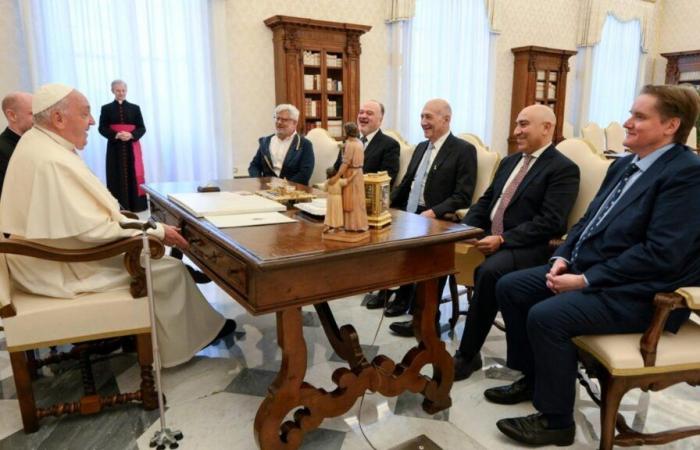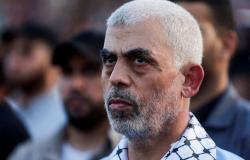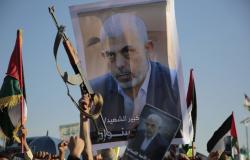The former Israeli Prime Minister and the former Palestinian Foreign Minister were received in a private audience by Francis on October 17. In Osservatore Romano they return to their dialogue for a peace plan and the status of Jerusalem which according to them should be managed by a guardianship of five States, including Israel and Palestine.
Roberto Cetera – Vatican City
«It was an important and moving meeting. The Holy Father has shown extraordinary interest in Middle East peace efforts“. Ehud Olmert, 78, former Prime Minister of the State of Israel, met Pope Francis this Thursday morning, October 17, in the company of the former Minister of Foreign Affairs of the Palestinian State, Nasser Al-Qidwa, and a delegation of peace activists. Olmert, who served as prime minister until 2009, has an important history in Middle East peace negotiations: under his government, a ceasefire was signed in the 2006 war in Lebanon, and he was responsible for the last real attempt at an agreement between the two states with Palestinian President Mahmoud Abbas, in the dynamic of the Oslo Accords of 1993, an agreement which was subsequently not reached. “Pope Francis gave us extraordinary attention for more than half an hour, explaining that he follows every development of the conflict on a daily basis and is in contact with Christians in Gaza every day».
«We have submitted to the Holy Father our peace proposal for Gaza which includes an immediate ceasefire, the release of Israeli hostages still held by Hamas as well as the simultaneous release of an agreed number of Palestinian detainees in Israeli prisons , and the resumption of negotiations for the creation of two distinct states at peace with each other“, explains former Palestinian Minister Al-Qidwa, known in Palestine not only for his positions in favor of peace, but also for being the nephew of the historic leader of the PLO, Yasser Arafat.
Mr. Olmert, how can we create two states today with the presence of ever-expanding illegal Israeli settler colonies?
We envisage the annexation by Israel of a portion of territory to be agreed equal to 4% of the West Bank of Palestine, in exchange for a territory of equal size today within Israel’s borders. A territory to be given to the Palestinians which would allow a corridor connecting the West Bank and Gaza.
Mr. Al-Qidwa, what solution for Gaza?
Israel must completely withdraw its army from Gaza and allow the creation of a Palestinian entity to administer it. We envisage, as a temporary and provisional solution, a council of commissioners composed of technocrats and professionals of recognized value and not of political representatives. This council should be linked to the Council of Ministers of the Palestinian Authority, which should finally prepare for general elections in the Palestinian territories within 24 to 36 months.
Mr. Olmert, would this exercise of goodwill on the part of both parties be enough, in your opinion, to guarantee immediate pacification?
No. We also believe that it is necessary to deploy a “Ptemporary Arab security presence» (TASP) which, alongside the withdrawal of the Israeli Defense Forces (IDF), could stabilize the situation. This Arab interposition force should be in contact with the security forces of the Palestinian National Authority and receive advice from the Council of Commissioners. Its main task should be to prevent further possible attacks against Israel from Gaza.
Mr. Al-Qidwa, how can the two-state solution guarantee a peaceful future?
By requiring the State of Palestine to be a non-militarized state, except for its internal law enforcement needs.
This would leave Mr. Olmert with the central problem unresolved: the status of Jerusalem…
This is the point that most interested Pope Francis during our meeting today. We are thinking of a special status for Jerusalem, which should be managed by a trusteeship of five States (including obviously Israel and Palestine) which would have full authority over each part of the city, according to the rules indicated on several occasions by the Security Council. of the UN, and with a special role attributed to the Kingdom of Jordan, as is already the case today for the Esplanade des Mosques. In any case, we believe that the old city should escape political control and be dedicated to the three monotheistic religions who consider it a sacred place of prayer.
And what about the claims of both parties to make Jerusalem the capital of their state?
Ehud Olmert: Jerusalem can be Israel’s capital in the parts that were already Israeli before June 5, 1967, in addition to Jewish neighborhoods built after ’67, which would fall within the 4.4% I mentioned above .
Nasser Al-Kidva: and Al-Quds, the capital of Palestine, would include all Arab neighborhoods that were not part of Israel before the ’67 war.
One last question, Mr. Olmert. This well-articulated plan risks remaining wishful thinking. It is in total contradiction with the intentions of the current Israeli government…
Those who know me know what I think of the government led by Netanyahu and subordinated to the extremist fanaticism of Ben Gvir and Smotrich. But I am heartened by the fact that 70% of Israelis are fed up with this coalition, with the enormous damage it has done to Israel and continues to do. Israel is a strong democracy and, democratically, it will overcome this government.
With what alternatives?
The civil society that has been protesting massively against Netanyahu for two years will be able to express a new leadership that we cannot even imagine today. Because, I repeat, Israel is a democratically living and solid country.






